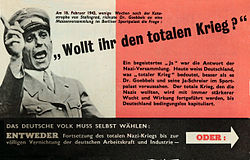
Back حرب نفسية Arabic Guerra psicolóxica AST Psixoloji müharibə Azerbaijani Псыхалягічная вайна BE-X-OLD Психологическа война Bulgarian মনস্তাত্ত্বিক যুদ্ধবিগ্রহ Bengali/Bangla Guerra psicològica Catalan جەنگی دەروونی CKB Psychologická operace Czech Psychologische Kriegsführung German

| Part of a series on |
| War |
|---|
Psychological warfare (PSYWAR), or the basic aspects of modern psychological operations (PsyOp), has been known by many other names or terms, including Military Information Support Operations (MISO), Psy Ops, political warfare, "Hearts and Minds", and propaganda.[1] The term is used "to denote any action which is practiced mainly by psychological methods with the aim of evoking a planned psychological reaction in other people".[2]
Various techniques are used, and are aimed at influencing a target audience's value system, belief system, emotions, motives, reasoning, or behavior. It is used to induce confessions or reinforce attitudes and behaviors favorable to the originator's objectives, and are sometimes combined with black operations or false flag tactics. It is also used to destroy the morale of enemies through tactics that aim to depress troops' psychological states.[3][4]
Target audiences can be governments, organizations, groups, and individuals, and is not just limited to soldiers. Civilians of foreign territories can also be targeted by technology and media so as to cause an effect on the government of their country.[5]
Mass communication such as radio allows for direct communication with an enemy populace, and therefore has been used in many efforts. Social media channels and the internet allow for campaigns of disinformation and misinformation performed by agents anywhere in the world.[6]
- ^ "Forces.gc.ca". Journal.forces.gc.ca. Retrieved 18 May 2011.
- ^ Szunyogh, Béla (1955). Psychological warfare; an introduction to ideological propaganda and the techniques of psychological warfare. United States: William-Frederick Press. p. 13. Retrieved 11 February 2015.
- ^ Chekinov, S. C.; Bogdanov, S. A. "The Nature and Content of a New-Generation War" (PDF). Military Theory Monthly = Voennaya Mysl. United States: Military Thought: 16. ISSN 0869-5636. Archived from the original (PDF) on 20 February 2015. Retrieved 11 February 2015.
- ^ Doob, Leonard W. "The Strategies Of Psychological Warfare." Public Opinion Quarterly 13.4 (1949): 635–644. SocINDEX with Full Text. Web. 20 February 2015.
- ^ Wall, Tyler (September 2010). U.S Psychological Warfare and Civilian Targeting. United States: Vanderbilt University. p. 289. Retrieved 11 February 2015.
- ^ Kirdemir, Baris (2019). Hostile Influence and Emerging Cognitive Threats in Cyberspace (Report). Centre for Economics and Foreign Policy Studies. JSTOR resrep21052.
© MMXXIII Rich X Search. We shall prevail. All rights reserved. Rich X Search